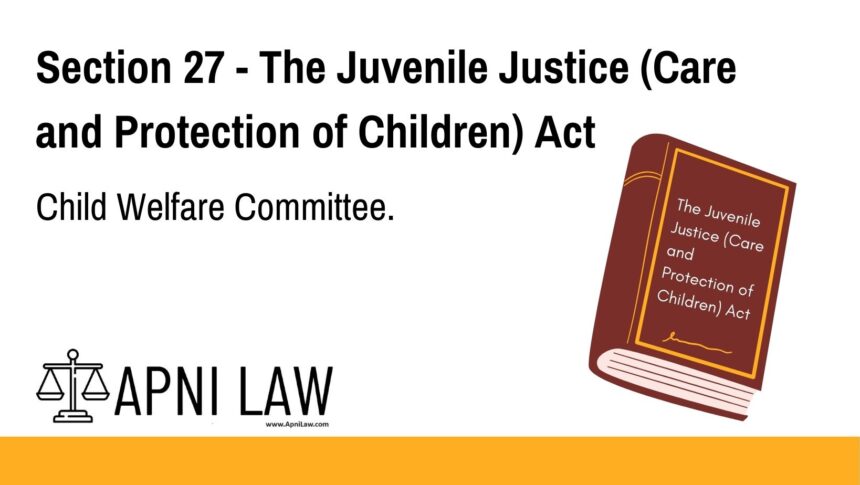Code
1) The State Government shall by notification in the Official Gazette constitute for every district, one or more Child Welfare Committees for exercising the powers and to discharge the duties conferred on such Committees in relation to children in need of care and protection under this Act and ensure that induction training and sensitisation of all members of the committee is provided within two months from the date of notification.
(2) The Committee shall consist of a Chairperson, and four other members as the State Government may think fit to appoint, of whom at least one shall be a woman and another, an expert on the matters concerning children.
(3) The District Child Protection Unit shall provide a Secretary and other staff that may be required for secretarial support to the Committee for its effective functioning.
(4) No person shall be appointed as a member of the Committee unless he has a degree in child psychology or psychiatry or law or social work or sociology or human health or education or human development or special education for differently abled children and has been actively involved in health, education or welfare activities pertaining to children for seven years or is a practicing professional with a degree in the above-mentioned fields.
(4A) No person shall be eligible for selection as a member of the Committee, if he—
(i) has any past record of violation of human rights or child rights,
(ii) has been convicted of an offence involving moral turpitude, and such conviction has not been reversed or has not been granted full pardon,
(iii) has been removed or dismissed from service of the Government or government-controlled entity,
(iv) has ever indulged in child abuse, employment of child labour, immoral acts, or any other human rights violations,
(v) is part of the management of a child care institution in the district.
(5) No person shall be appointed as a member unless he possesses such other qualifications as may be prescribed.
(6) No person shall be appointed for a period of more than three years as a member of the Committee.
(7) The appointment of any member of the Committee shall be terminated by the State Government after making an inquiry, if—
(i) he has been found guilty of misuse of power under this Act;
(ii) he has been convicted of an offence involving moral turpitude and not pardoned;
(iii) he fails to attend Committee proceedings consecutively for three months without valid reason or fails to attend minimum three-fourths of the sittings in a year.
(8) The Committee shall submit a report to the District Magistrate in such form as may be prescribed and the District Magistrate shall conduct a quarterly review of the functioning of the Committee.
(9) The Committee shall function as a Bench and shall have the powers conferred by the Code of Criminal Procedure, 1973 on a Metropolitan Magistrate or Judicial Magistrate of First Class.
(10) The District Magistrate shall be the grievance redressal authority to entertain any grievance arising out of the functioning of the Committee. Affected children or any concerned party may file a complaint, and the District Magistrate shall pass appropriate orders after giving a hearing.
Explanation
Section 27 outlines the constitution, structure, eligibility, powers, and responsibilities of the Child Welfare Committee (CWC), which is the statutory body mandated to care for and protect children in distress.
Key highlights:
-
Every district must have at least one CWC constituted through government notification.
-
The committee must consist of five members, including at least one woman and one child-rights expert.
-
Only qualified professionals with a background in child welfare, psychology, law, etc., and a clean record are eligible for appointment.
-
Members are appointed for a term of up to three years, with clear provisions for disqualification and removal.
-
The CWC functions like a judicial bench and has powers similar to those of a Metropolitan or Judicial Magistrate.
-
It is accountable to the District Magistrate, who also serves as the grievance redressal authority.
Illustration
🔸 Example:
A district in Uttar Pradesh notifies a new Child Welfare Committee. One of the members is a senior social worker with 10 years of experience in child welfare, while another is a school counselor with a degree in child psychology. If a child is rescued from a dangerous home environment, this committee will hold a hearing and may decide to place the child in temporary care, ensuring protection and rehabilitation.
Common Questions and Answers
Q1: What is the minimum qualification to become a member of the CWC?
A degree in child psychology, psychiatry, law, social work, sociology, health, education, or special education, along with 7 years of active involvement in child-related activities.
Q2: Can someone working in a child care institution be on the Committee?
No, such individuals are disqualified under sub-section (4A)(v).
Q3: What if a member fails to attend the Committee meetings regularly?
The State Government may terminate the appointment if a member misses three consecutive months or fails to attend 75% of meetings annually.
Q4: Who can complain about the Committee’s actions, and where?
Any affected child or concerned person may complain to the District Magistrate, who will review the issue and take appropriate action.
Conclusion
Section 27 of the Juvenile Justice Act is vital in operationalizing the framework for protecting children in need. By prescribing strict eligibility, professional qualifications, and legal accountability for CWC members, the law aims to ensure that vulnerable children receive fair, informed, and compassionate treatment. The oversight by the District Magistrate adds a vital layer of checks and balances, reinforcing the child-centric focus of the Juvenile Justice system.








